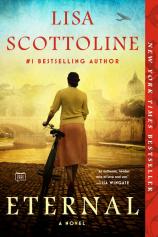Reading Group Guide
Discussion Questions
Eternal

1. ETERNAL opens with Elisabetta’s story, and the prologue raises the question of the paternity of her son. Did that matter to you as you read along and, if so, how? Did you keep it in mind or forget about it? What do you think happens to Elisabetta and her family after the novel’s end? How do you think her son will react to learning his mother’s and father’s secrets?
2. At the beginning of ETERNAL, Lisa Scottoline quotes the late Italian novelist Ignazio Silone, who said, “Let everyone, then, have the right to tell his story in his own way.” Why is it so important for Elisabetta to tell her own story --- and, particularly, to write it? Isn’t everyone’s life story compelling in some way? Did you ever have the urge to write or tell yours, if only for yourself and your family? Do you ever wish you knew more about the life story of your own parents?
3. If you read the Author’s Note, you learned that some of the incidents in ETERNAL were inspired by true events that took place in Mussolini’s ventennio and World War II. This applies to the horrific events as well as the inspiring ones. Were you aware of these events before reading the novel? Did any of the historical events surprise you? Did knowing that many of the novel’s events are true shape the way you felt about what you had read? And how about the characters based on actual historical figures? Did they interest you and, if so, why?
4. How do Sandro’s and Marco’s feelings for Elisabetta transform over the course of the novel? Why do you believe that each of them fell in love with her? What was their ultimate expression of this love? Do you think that Elisabetta ended up with the “right” person? Whom would you choose?
5. ETERNAL is a novel about families, too. Compare and contrast the parents of Marco, Elisabetta and Sandro. Each parent faced their own struggles and made what could be considered mistakes while raising their children, as all parents do. How were the three main characters affected by them? Why do you think their parents each made the decisions that they did?
6. How does Marco’s attitude toward the Fascist party change? What attracted him to their ethos? Or do you think he was indoctrinated into their belief system? Love of country is beautiful, but when does it turn ugly? When does fandom turn into a cult of personality? Why did Marco’s brothers take a different view? Take a look at the different events that bring about the transformation in Marco’s loyalties during ETERNAL.
7. The father/son conflict between Beppe and Marco, and between Massimo and Sandro, helps and hurts all four men, and the mother/daughter conflict between Serafina and Elisabetta shapes Elisabetta in many ways. Is that still true, or have modern psychology and times affected our view of the parent/child relationship?
8. Rome is practically a character in ETERNAL; we get to experience the culture, atmosphere and feel of the city. Discuss your impressions of the setting, and of how Rome impacts each of the characters. How is the story influenced by a feeling of community --- or, at other times, of isolation? How is “community” built in the novel?
9. Is there a hero in ETERNAL? Is there a villain? How do our perceptions of “heroes” and “villains” change throughout the read? How do each of the main characters show bravery during the occupation of Rome or at other times? What do you think constitutes heroism during wartime?
10. So much has been written about World War II in fiction, but how is ETERNAL different? Did you learn anything new about the Holocaust? Additionally, why is it so important to tell the stories of the Jewish families who died during the Nazi raid on the Ghetto and the subsequent deportations?
11. A major difference between Fascism in Italy and Nazism in Germany is that Fascism did not begin as anti-Semitic, as the novel shows. What other similarities and differences do you see? Were you surprised to learn that Hitler imitated Mussolini and not the other way around? How can an entire population lose its way so profoundly? Do you understand it better as a result of the book, or not?
12. Discuss the meaning of the quote near the end of ETERNAL: “Hate was eternal, but above all, so was love.” Take a look at this quote in the context of each of the surviving characters’ lives and actions.
Eternal
- Publication Date: February 1, 2022
- Genres: Fiction, Historical Fiction, Women's Fiction
- Paperback: 496 pages
- Publisher: G.P. Putnam's Sons
- ISBN-10: 0525539794
- ISBN-13: 9780525539797







